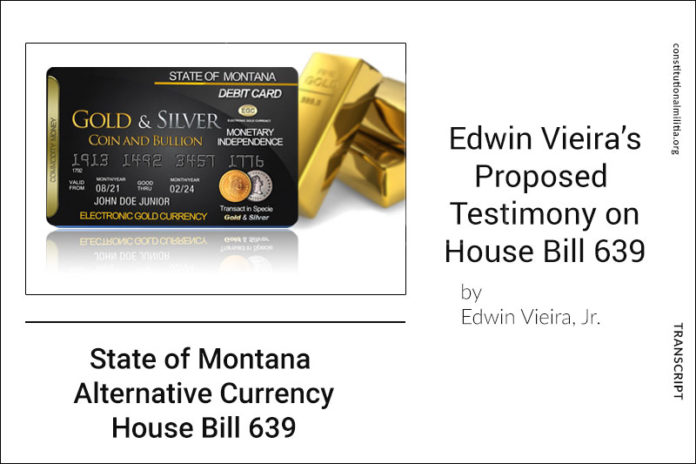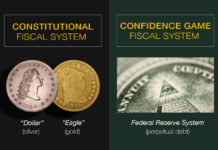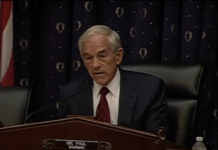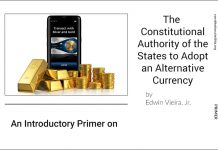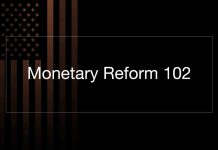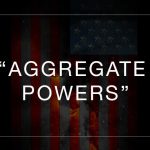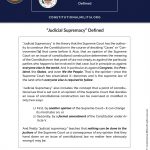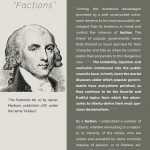Last Updated on February 9, 2023 by Constitutional Militia
Download Montana House Bill 639 here.
Download the State Electronic Gold Currency Plan (Gold Money Bill) here.
To learn about the “Money” power of the States: An Introductory Primer on the Constitutional Authority of the States to Adopt an Alternative Currency here.
EDWIN VIEIRA’S PROPOSED TESTIMONY
ON HOUSE BILL 639, 11 MARCH 2009
STATE OF MONTANA
[Full Text Version]
In a sense, I am the “foster father” of House Bill 639, because it largely derives from a bill I drafted for certain State legislators in New Hampshire several years ago. At that time, the plan proposed in this bill was pooh-poohed as visionary; but now in many circles it is being recognized as prophetic.
Here, I shall address three questions: First, what is the purpose of this legislation? Second, how does this legislation operate? And third, why is this legislation necessary?
1. This legislation provides the citizens of Montana with the option of conducting their financial transactions with their State government on the basis of an alternative currency consisting of gold and silver, rather than Federal Reserve Notes. It establishes a mechanism through which—to the degree the State and her citizens deem prudent—the State can separate her own financial transactions from the Federal Reserve System; and, eventually, based upon the State’s action, Montana’s private economy as a whole can move away from dependence on the Federal Reserve System, too.
This proposal is not a partisan issue, because everyone’s most vital interests are equally at stake here:
The provision of an alternative currency consisting of gold and silver will engender economic stability. It will return to Montanans the ability to save real wealth in the form of money that does not systematically depreciate in purchasing power, and with that the further capability to plan and prepare rationally for their economic futures.
The provision of an alternative currency will promote social justice. It will begin to rectify the wrongs perpetrated against wage earners whose standards of living cannot keep up with the systematic inflation built into the Federal Reserve System; against the elderly and infirm who live on fixed incomes that steadily erode in purchasing power; against those anxiously approaching retirement while watching the real values of their pension funds evaporate; against the poor whose only wealth is the small amount of currency they acquire from week to week; and against all the recipients of essential public services that the State finds it difficult or even impossible to provide to the requisite degree because the real values of tax revenues cannot keep pace with costs. And,
The provision of an alternative currency will fulfill the State’s legal, moral, and political responsibility to protect the safety, health, and general welfare of her people against an economic calamity that no one doubts confronts this country at the present time.
2. House Bill 639 empowers the State of Montana to employ an alternative currency in all of her financial transactions that relate to the performance of her sovereign governmental functions. Through the cigarette and tobacco products taxes, the State will receive “electronic gold currency”. It will then pay out that currency, on a first-come, first-served basis, to whichever of its creditors elect to receive it, until the supply of that currency is exhausted.
The anticipation is that, as the Federal Reserve System becomes increasingly unstable and its currency increasingly depreciates in value, creditors’ requests for payments in “electronic gold currency” will exceed the supply, and to meet those requests the State will expand the class of taxes required to be paid in “electronic gold currency”—until, at some point in the future, most if not all of the State’s income and expenditures will be received and paid out in that currency. During this process, taxpayers and creditors of the State will recognize the advantage of employing “electronic gold currency” in their own private transactions with third parties, resulting in the gradual replacement of Federal Reserve Notes by “electronic gold currency” throughout both the public and the private sectors.
Initially—
• This legislation is largely voluntary. Except for the entities liable for cigarette and tobacco products taxes, which must be paid in “electronic gold currency” in order to “prime the pump”, Montana’s citizens may pay their taxes, and receive payments from the State, in “electronic gold currency”, or in Federal Reserve Notes, as they see fit. If they choose to receive “electronic gold currency”, they may also convert that currency into gold and silver coin.
• This legislation is basically experimental. It allows the State’s citizens to determine, by their own free choice, and on the basis of economic circumstances as they develop, the degree to which they and their State’s government should continue to employ Federal Reserve Notes, or should substitute gold and silver, as their media of exchange.
• Thus, an expanding rôle for “electronic gold” as an alternative currency in Montana will depend entirely on the people’s support. If Montanans do not desire to receive gold and silver from the State and to use them in their own private transactions in the free market, then the State will simply accumulate a small amount of “electronic gold” each year from the limited sources of such revenue that the bill initially establishes. This, however, will not occur unless the Federal Reserve System remains so stable that an alternative currency would serve no purpose. And the likelihood of that occurring in the near term is quite small.
• On the other hand, if Montana’s people increasingly desire to receive gold and silver from the State and to employ them in their own private transactions because the economic benefits of doing so are manifest and significant, and for those benefits the people are willing to pay their taxes in gold and silver, then the State will soon establish her finances—in both the public and the private sectors—entirely on the basis of “electronic gold”.
• This legislation adopts a sequential approach. An entire State’s monetary system cannot be transformed overnight. An alternative currency must be introduced at only one point in time. Thereafter, the free market must be allowed full latitude to establish a new structure of prices denominated in the new currency at the rate the market determines is most conducive to maintaining economic equilibrium. As part and parcel of this process, participants in the market must be allowed to become familiar with and confident in the use of that currency at their own pace. Therefore, this bill begins the transition on only a small scale—but establishes an operational structure that can be expanded step by step to encompass at length all of the State’s financial transactions, if and when Montanans so desire.
• This legislation is also prudent. Although experimental, this bill exposes the State to little financial risk, because the “electronic gold currency” collected in taxes can be exchanged at a moment’s notice for Federal Reserve Notes or bank credits should that course be indicated. The bill involves little administrative expense, either. For the cost to the Treasury of maintaining one or more “electronic gold currency accounts” will be small. Even if that were not the case, however, whatever administrative costs might eventually be involved would be vastly outweighed by the costs the State and her people would incur were such an arrangement not in place when the Federal Reserve System collapses. Certainly the costs of attempting to establish an alternative currency in the face of a complete economic breakdown would be huge.
Moreover, this bill could represent the wisest economic investment the State of Montana has ever made. Upon enactment of this legislation, Montana will become the first major political jurisdiction in the entire world to establish a sound monetary system. Gold mining and related industries will boom. Because the State’s economy will actually employ gold and silver as media of exchange, gold and silver will flow into the State as capital for productive uses, rather than simply being held in sterile hoards as investment-hedges against the depreciation of Federal Reserve Notes. And because the State’s Treasury will be able to issue bonds with gold and silver payment clauses backed by State taxes receivable exclusively in “electronic gold currency”, Montana will be able to borrow for long terms at low rates of interest to fund public projects.
3. This legislation is imperatively necessary because: First, Montana, no less than America as a whole, is confronted by the most serious economic crisis in this country’s history—a crisis the underlying cause of which is monetary in nature. And second, no one other than a State legislature will, or can, take corrective action in time.
The underlying problem is this country’s reckless use of debts as currency—particularly, debts capable of being emitted in unlimited amounts, because they are irredeemable in gold, silver, or any other valuable monetary commodity.
The Federal Reserve System—the issuer of debt-currency in the form of Federal Reserve Notes and bank-credits solvable in those notes—is the crux of the problem. The Treasury of the United States is closely leagued with the Federal Reserve System in culpability, because the Treasury “monetizes” United States debt through the banking cartel, thus enabling the General Government to engage in essentially unlimited “deficit spending”. But the ultimate source of the evil is Congress, because the Federal Reserve System is the creature of a statute which Congress can alter, amend, or even repeal at any time; and the Treasury can neither borrow nor spend without Congress’s authorization.
Ever-increasing numbers of Americans are coming to doubt that these institutions, singly or in any combination, will ever put into practice fundamental reforms rationally responsive to the present economic crisis. And for good reason: The Federal Reserve System, the Treasury, and Congress allowed—and in many particulars participated in, facilitated, encouraged, and even profited from—creation of the gigantic bubble of public and private debt which is today collapsing with catastrophic consequences to this nation’s economy. Now, the selfsame bankers and public officials responsible for this dire state of affairs are trying simply to keep the bubble inflated with unprecedented infusions of new currency and credit in one gargantuan financial “bail out” after another—which will most likely lead in the not-too-distant future to the worst of all economic catastrophes: an hyperinflationatry depression, wherein the currency depreciates to worthlessness as the productive economy grinds to a halt, with massive levels of unemployment, social unrest, and political upheavals. This attempt to prop up the present fatally flawed monetary and banking systems for as long as possible will only further undermine the financial stability, perhaps the survivability, of America’s economy.
The fundamental dishonesty of the Federal Reserve System arises from using debts (which are always liabilities) as currency (which is supposed to be an asset). This situation can be rectified only by introducing an alternative currency with no component of debt involved in its issuance. When monetary and banking crises have broken out in the past, gold and silver have always proven to be the ultimate stores of value, measures of value, and media of exchange. Currencies consisting of those metals are, of course, debt free. And currencies consisting of gold and silver cannot be increased in amount beyond the free market’s actual need for them, because the production of gold and silver bullion and coinage requires the inputs of scarce and expensive capital and labor for which other uses compete in the marketplace. So, the most historically tested and proven way to reduce the severity of the present crisis, and to provide significant security against the ravages of future hyperinflation, is to reintegrate gold and silver as currency into Americans’ ordinary financial transactions to the greatest degree and as quickly as possible.
In principle, such a reform could come from Congress, the American people themselves, or the States—
(i) To expect it from Congress at all, however, is unrealistic in the extreme—so the less said about that possibility the better.
(ii) To expect such a reform from the people in time is also unlikely. Merely as individuals, Americans cannot effect monetary reform by the simple expedient of themselves adopting silver and gold as their preferred media of exchange in random private transactions. True, such actions may provide some measure of self-protection against the ravages of monetary instability for a relatively few individuals scattered here and there. But for genuine reform of the monetary system as a whole to occur, whatever is done must operate both extensively and comprehensively—that is, it must involve in the process a significant number of people, and affect a substantial portion of the economy, within a large geographical area. For that reason, the preferable method for reform must be precisely directed, systematic, and institutionalized, rather than dependent upon only the uncoördinated efforts of individuals most of whom will be unaware of, and therefore unable to support, each others’ activities.
Moreover, the preferable method must be economically viable from its very onset. If even a sound plan for monetary reform is too complex or costly to implement in its initial stages, nothing will be done. In the nature of things, cost alone excludes reliance on the efforts of isolated individuals to achieve monetary reform. Americans have always enjoyed the right to own silver. Although from 1933 onwards they were denied the right to own gold, that right was restored in 1974. [Act of 14 August 1974, Pub. L. 93-373, § 2(b, c), 88 Stat. 445, 445.] Also, although from 1933 onwards Americans were denied the right to make contracts payable in gold or in a particular kind of coin or currency measured in gold (so-called “gold-clause contracts”), that right was restored in 1977. [Act of 28 October 1977, Pub. L. 95-147, § 4(c), 91 Stat. 1227, 1229, now codified in 31 U.S.C. § 5118(d)(2).] Furthermore, gold-clause contracts never have been and are not now subject to the legal-tender law. [Compare 31 U.S.C. §§ 5103 and 5118(d)(2) with Bronson v. Rodes, 74 U.S. (7 Wallace) 229 (1869), and Butler v. Horowitz, 74 U.S. (7 Wallace) 258 (1869).] So, gold-clause contracts would serve the interest of every ordinary American in monetary reform—because, if sufficiently widespread in use, such contracts would effectively demonetize Federal Reserve Notes in favor of gold and silver. Nonetheless, since 1977 contracts specifying payments in those metals have played no measurable rôle in commerce in the free market anywhere in the United States—simply because the expenses that gold-clause contracts add to the normal costs of doing business preclude their use by most isolated individuals.
One added expense is what economists call “information costs”. Before they can weigh the merits of actually employing gold-clause contracts, individuals must educate themselves about the economic advantages of adopting silver and gold as their media of exchange, as well as the dangers from continuing to accept irredeemable Federal Reserve Notes. In addition, they must enlighten themselves as to their legal rights to employ the precious metals in preference to, and even to the exclusion of, the Federal Reserve System’s currency. And once they have decided to use gold-clause contracts, individuals must learn how to negotiate and administer such contracts.
Another expense is “transaction costs”. Every business transaction requires at least two economically complementary parties. For such a transaction to occur on the basis of a gold-clause contract, the parties must also be complementary in that they both recognize the mutual advantage in employing silver and gold as their media of exchange, they both understand how to do it, and they both can convince their attorneys, accountants, and other advisors of the necessity and propriety of such a course.
A further expense is “opportunity costs”. While an individual is searching out a complementary partner to consummate some business transaction on the basis of a gold-clause contract, he may lose the benefits of a deal that can be struck right away with someone else on the basis of payment in Federal Reserve Notes. Obviously, the higher the information costs and transaction costs of conducting a particular business deal on the basis of a gold-clause contract, the more likely will opportunity costs preclude the use of silver and gold.
To be sure, a few individuals, aware that the costs of gold-clause contracts will decrease and the benefits such contracts provide will increase in proportion to the number of people who use them, may choose to absorb these costs in order to promote monetary reform for patriotic reasons. Most individuals, though, for whom the costs of gold-clause contracts are large and immediate and their benefits apparently small or remote, will wait until others’ efforts bring about a favorable balance between costs and benefits before they employ such contracts in their own business ventures. Self-evidently, a plan for monetary reform is doomed from the start if it depends upon the efforts of a small core of self-selected, self-directed, self-sacrificing altruists, with everyone else operating as a classic “free rider” who hopes eventually to reap benefits without ever sharing a commensurate burden of costs. [See, e.g., Mancur Olsen, The Logic of Collective Action: Public Goods and the Theory of Groups (rev. ed. 1971).] And even were such a plan not economically impractical, it would be dangerously imprudent: America cannot simply wait for patriotic individuals to absorb these costs, one by one or in small groups, on their own, until at last they constitute a critical mass making for monetary reform—because a full-blown monetary catastrophe surely will overwhelm this country long before then. As is obvious right now.
(iii) The one entity capable of implementing a workable plan to return a significant part of this country to sound money in a rapid fashion is a State. That is the reason for this bill. Three principles support it: namely,
First, as a State, Montana enjoys complete constitutional authority to employ whatever currency she desires in the performance of her sovereign governmental functions.
Second, as a State, Montana has the moral and political responsibility, and fiduciary duty, to protect and advance the health, safety, and welfare of all her citizens in every manner possible, including the adoption of her own State monetary system.
Third, as a State, Montana has the practical ability successfully to adopt gold and silver as her media of exchange, and in so doing to serve as an exemplar for monetary reform throughout the United States.
Let us now consider each of these principles:
a. As a State, Montana enjoys complete constitutional authority to employ whatever currency she desires in the performance of her sovereign governmental functions.
Contrary to much misguided popular opinion, “monetary policy” is not the exclusive domain of Congress, the Treasury of the United States, or the Federal Reserve System. The Tenth Amendment to the Constitution of the United States declares that “[t]he powers not delegated to the United States by the Constitution, nor prohibited by it to the States, are reserved to the States respectively, or to the people”. And Article I, Section 10, Clause 1 requires that “[n]o State shall * * * make any Thing but gold and silver Coin a Tender in Payment of Debts”. Nowhere does the Constitution delegate to Congress a power to require the States to employ as their media of exchange or “legal tender” only the currency designated by Congress. Neither does the Constitution entirely prohibit the States from adopting their own currency or “legal tender” for “Payment of Debts”, but merely limits that power to “gold and silver Coin” in general. Thus, the Constitution explicitly reserves to the States the power and the duty to “make * * * gold and silver Coin a Tender in Payment of Debts”—notwithstanding what currency other than “gold and silver Coin” Congress may itself issue or license the Treasury or the Federal Reserve System to emit.
In addition, the Supreme Court of the United States has squarely and repeatedly held that Congress lacks any constitutional power to specify what the States must use as legal tender or media of exchange in the exercise of their reserved sovereign functions. [ Lane County v. Oregon, 74 U.S. (7 Wallace.) 71 (1869); Hagar v. Reclamation District No. 108, 111 U.S. 701 (1884).] House Bill 639 empowers and enables Montana and her citizens to employ gold and silver as their media of exchange with respect to the most important of Montana’s sovereign governmental functions: namely,
• taxation
• borrowing by the State
• payment of State legislators, officials, employees, contractors, suppliers, and other creditors:
• payment for takings of private property through eminent domain: and
• payment of judgements, fines, penalties, and other monetary awards in the courts of justice.
Therefore, this bill comes within and applies the rule of law the Supreme Court has approved.
Furthermore, although this bill employs “electronic gold currency” as its primary medium of exchange, it also requires that such currency be fully convertible into gold and silver coin, including United States gold and silver coin. At the present time, Congress authorizes the coinage of silver and gold, sufficient to meet public demand. [Title 31, United States Code, §§ 5112(a)(1-7) (gold) and 5112(e) (silver).] Congress has declared this coinage to be legal tender. [Title 31, United States Code, §§ 5103 and 5112(h).] This bill allows and assists Montana’s citizens to use Congress’s gold and silver coinage as their legal tender. Thus, through this bill Montana will both recognize and implement the constitutional power of Congress with respect to coinage, and obey the constitutional requirement that Montana not “make any Thing but gold and silver Coin a Tender in Payment of Debts”.
b. As a State, Montana has the moral and political responsibility, and fiduciary duty, to protect and advance the health, safety, and welfare of all her citizens in every manner possible, including the adoption of her own State monetary system.
In America’s federal system, the States retain the primary, and the ultimate, moral and political responsibility for maintaining their people’s health, safety, and welfare. In Montana (and every other State) that responsibility resides in the Legislature—and cannot be delegated, let alone surrendered, to anyone else. Least of all can it be shirked or evaded. In that regard, the motto of every State’s Legislature should be President Truman’s aphorism: The buck stops here.
Montana cannot fulfill her duty to promote the general welfare of her citizens if she supinely suffers her economy to crumble, collapse, and succumb to chaos because of the breakdown of the Federal Reserve System. Montana enjoys more than enough constitutional authority to deal with this imminent danger within her own territory. And being both confronted by the problem and possessed of the power to deal with it implies the duty to act in the most timely and effective manner possible.
Moreover, America’s federal system has always allowed and encouraged State legislatures, within broad limits, to experiment with new laws in an effort to achieve socially desirable results. [See, e.g., Whalen v. Roe, 429 U.S. 589, 597-98 & n.22 (1977); Johnson v. Louisiana, 406 U.S. 356, 376 (1972) (opinion of Powell, J.); California v. Green, 399 U.S. 149, 184-85 (1970) (Harlan, J., concurring); Fay v. New York, 332 U.S. 261, 296 (1947).] This bill falls squarely within that tradition.
c. As a State, Montana has the practical ability successfully to adopt gold and silver as her media of exchange, and in so doing to serve as an exemplar for monetary reform throughout the United States.
To be effective, an alternative currency must circulate on as widespread a basis as possible. Therefore, to succeed in introducing an alternative currency requires a major participant in the market—one with which ordinary people in large numbers financially interact on a regular and permanent basis throughout a broad geographical area, and which takes in and pays out significant amounts of purchasing power in whatever currency it employs. A State government fulfills this requirement perfectly.
Through taxation, borrowing, and spending, Montana’s government is a large, permanent, and continuous participant in the State’s total economy. Taxation, borrowing, and spending create a steady flow of purchasing power between the State Treasury and the private sector. Very large numbers of Montanans are taxpayers, or recipients of governmental payments of one sort or another, or both. And the amounts of purchasing power taken into and paid out of the State Treasury are significant in terms of the total monetary transactions within the State’s economy.
In addition, Montana can employ an alternative currency without incurring to any significant degree the costs that would retard and frustrate purely private action. “Information costs” will be minimized, because the State’s actions in implementing this legislation will quickly educate her population as to the availability, as well as the desirability of employing, an alternative currency. “Transaction costs” will be minimized, because the initial infusion of gold and silver into the process will be compelled through taxation. And “opportunity costs” will also be minimized, because so many people have no practical choice other than to deal with the State and the State with them with respect to taxation, borrowing, and spending.
One can also predict with a high degree of confidence that, if this legislation is enacted, “as Montana goes, so goes the nation as a whole”. For, as the Federal Reserve System slides inexorably into collapse, other States and their citizens, increasingly desperate for a solution to their own economic problems, and aware that economic recovery cannot be had without a sound currency, will naturally follow Montana’s lead.
The first State that takes the initiative in this matter will be the exemplar for others. A State government’s adoption of an alternative currency cannot long remain unnoticed by the national, and even international, media. The positive economic effects that such action will immediately have within the State’s economy will lend its decision the highest credibility. And the positive political effect throughout America—proving that the States do retain the sovereign authority to solve within their own jurisdictions the thorniest problems that incompetent officials in Washington, D.C., have foisted on the country—will be incalculable.
In conclusion, House Bill 639 presents this Committee with an opportunity to take the first step in reforming, not only Montana’s, but even the entire country’s monetary system. This bill can provide Montana with a workable alternative currency, and thereby enable her to escape the worst effects of the monetary crises that will surely envelop this country in the near future. For that reason, the Committee should vote to send this bill to the full House for its consideration.
But with this opportunity comes an extremely heavy responsibility as well. This matter is too important to be left to a single legislative committee’s determination. More than any other issue in recent memory, the need to provide Montana with a economically sound and constitutional alternative currency vitally affects every resident of this State, and perhaps every resident of the United States as a whole—not simply immediately, but for many years to come. A mistake made here and now may prove incapable of correction later on. Therefore, every Representative should participate in the debate and have a vote on the outcome. For that reason especially, I urge the Committee to vote to send House Bill 639 to the full House for plenary consideration.




























